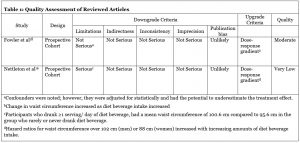Diet Beverage Consumption and Waist Circumference
Abstract
Background: The rampant problem of obesity, with its related comorbidities, continues to grow in the U.S. This puts strain on national resources and drives up healthcare costs worldwide. Researchers continue to search for the leading offenders in the diets of Americans that contribute to the epidemic. The connection between sugar-sweetened beverages and metabolic disorders is now well-established, being associated with cardiovascular disease, diabetes, cancers and overall mortality. These conditions are further exacerbated in individuals with higher amounts of central abdominal or visceral adiposity. In response to these findings, many consumers have turned to artificially-sweetened “diet” beverages in hopes of mitigating the detrimental effects of weight gain and related illness. The effect of diet beverages on central abdominal adipose deposition and associated comorbidities has not been studied adequately. However, early findings suggest diet beverages may also contribute to increased abdominal girth, metabolic syndrome and may be associated with the same comorbidities as their sugary counterparts.
Methods: An extensive search of MEDLINE-PubMed, CINAHL, Science Direct and Google Scholar was performed to identify research investigating diet soda consumption and central abdominal adiposity. The studies were evaluated using GRADE criteria.
Results: A search of currently-available research yielded 62 studies, two of which met eligibility criteria. Fowler et al and Nettleton et al both conducted prospective cohort studies evaluating the impact of diet beverages on central abdominal obesity. Fowler et al demonstrated a 2- to 3-fold increase in waist circumference, and Nettleton et al revealed a hazard ratio for participants who consumed ≥1 serving of diet beverages per day as 1.59 (1.23-2.07).
Conclusion: These studies suggest diet beverages may contribute to the development of central abdominal adiposity and metabolic syndrome. However, additional research is needed to assess the effect diet beverages may have on central obesity. Clinicians may consider refraining from advising their patients to consume diet beverages in place of sugar-sweetened beverages until their effect on central obesity is better established.
Keywords: Diet soda, nonnutritive sweeteners, abdominal obesity, waist, central obesity, metabolic syndrome
(Click on image to enlarge.)
REVIEWED STUDIES:
Fowler SPG, Williams K, Hazuda HP. Diet Soda Intake Is Associated with Long-Term Increases in Waist Circumference in a Biethnic Cohort of Older Adults: The San Antonio Longitudinal Study of Aging.J Am Geriatr Soc. 2015;63:708-715.
Nettleton JA, Lutsey PL, Wang Y, Lima JA, Michos ED, Jacobs Jr. DR. Diet Soda Intake and Risk of Incident Metabolic Syndrome and Type 2 Diabetes in the Multi-Ethnic Study of Atherosclerosis (MESA).Diabetes Care. 2009;32:688-694.
AUTHOR: Austin Higginson graduated from Pacific University, School of PA Studies in August 2017.


